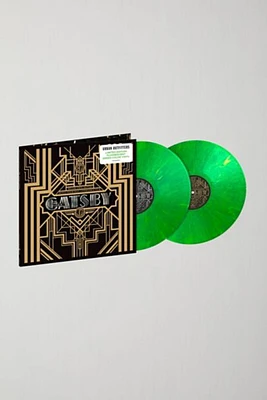Home
Rembetika: Greek Music from the Underground
Barnes and Noble
Rembetika: Greek Music from the Underground
Current price: $29.99


Barnes and Noble
Rembetika: Greek Music from the Underground
Current price: $29.99
Size: OS
Loading Inventory...
*Product information may vary - to confirm product availability, pricing, shipping and return information please contact Barnes and Noble
Thanks to the crazy music fans at
JSP
in England comes this packed four-disc overview of
rembetika
, the true music of Greece's underworld.
Rembetika
has an interesting history. Its origins are not exactly known, and are traced back in various labyrinthine ways to the mid-19th century. In 1911, the word "rembetico" appeared on a record label, and the word was defined as being of "mildly erotic," bohemian content; it was used to describe such records through the mid-'20s. Beginning around 1925, the music's name changed and became associated most specifically with the underworld -- primarily because of music played in brothels, hash dens, prisons, and other generally criminal surroundings. It was raw, immediate, sometimes harsh and bawdy, other times noir-ish and seductive in a sinister way. The music listeners now consider true
came into view after the Greco-Turkish war. It flourished between 1925 and 1937 when it was officially censored as immoral by the
Metaxas
government. The music lived, however, and went deeply underground; it surfaced again briefly around 1946 before it was once again censored. The instrument
brought to Greece's popular consciousness was the bouzouki, though violins, ouds, hand percussion, and singing were all part of the
experience. These four discs here are organized around various themes. The first one focuses on the music made in the golden years as the material developed into a bona fide recordable style as it emerged out from under the thumb of the Ottoman Empire. Singers such as
Marika Papagika
,
Achilleas Poulos
Rita Abadzi
Stellakis Perpiniadhis
, and
Kostas Karipis
are all featured on this slab. Disc two begins in 1932. Forced underground by the government, the music often the seamy side of life, more so since it is now the music of the "criminal" element. This is where the bouzouki and baglama come into prominence. Most of the performers here are male, and they make an impression with their swirling darkness and tales of lost love, drunkenness, power, violence, and grief. From the start, the bouzouki reigns supreme as
Markos Vamvakaris
sings
"I Klostirou (The Mill Girl)."
Long intricate instrumental patterns dig into the lyric and assert themselves at the tune's nadir.
Yiorgos Batis
'
"I Fylakes Tou Oropou (Oropos Jail)"
is another punch in the gut as he sings with rage about his pain and isolation.
Vamvakaris
and
Batis
are featured on this disc many times, but their contributions make the listener desire more.
Stellios Keromytis
is also here, and his
"I Moni Mou Parigoria (My Only Consolation)"
is one of the this disc's highlights.
Disc three, entitled Dope, Dice, Guitars, Knives and Such, documents the criminal scene from 1928 to 1946. And some familiar names are here such as
Jack Halikias
, whose
"Raste Tou Deke"
was the first true
hit to feature the bouzouki. Also included are wonderfully decadent tunes by
George Katsaros
Roza Eskenazi
Gus Dussas
. The final volume in the set showcases the brief popularity -- above ground -- of
. The big names in the scene are here, like
Perpiniadhis
Stratos Payoumtzis
Yiannis Papaiouannou
Apostolos Hadzichristos
. But this is also the place where
as a root music virtually disappears from the popular song scene, and goes so far underground that it almost -- almost -- ceases to exist. The rawness of the presentation returns, the narratives of erotic allure and tales of the forbidden go back into the shadows.
's documentation is superb. The notes are historical, with a different set for each volume, and the histories of performers, origins of terms, words, and a pronunciation guide are provided. Like the great
blues
collections,
Rembetika: Greek Music from the Underworld
is a treasure trove of the lost, forgotten, and dangerous. It's as soulful a documentary collection as you'll fine anywhere. ~ Thom Jurek
JSP
in England comes this packed four-disc overview of
rembetika
, the true music of Greece's underworld.
Rembetika
has an interesting history. Its origins are not exactly known, and are traced back in various labyrinthine ways to the mid-19th century. In 1911, the word "rembetico" appeared on a record label, and the word was defined as being of "mildly erotic," bohemian content; it was used to describe such records through the mid-'20s. Beginning around 1925, the music's name changed and became associated most specifically with the underworld -- primarily because of music played in brothels, hash dens, prisons, and other generally criminal surroundings. It was raw, immediate, sometimes harsh and bawdy, other times noir-ish and seductive in a sinister way. The music listeners now consider true
came into view after the Greco-Turkish war. It flourished between 1925 and 1937 when it was officially censored as immoral by the
Metaxas
government. The music lived, however, and went deeply underground; it surfaced again briefly around 1946 before it was once again censored. The instrument
brought to Greece's popular consciousness was the bouzouki, though violins, ouds, hand percussion, and singing were all part of the
experience. These four discs here are organized around various themes. The first one focuses on the music made in the golden years as the material developed into a bona fide recordable style as it emerged out from under the thumb of the Ottoman Empire. Singers such as
Marika Papagika
,
Achilleas Poulos
Rita Abadzi
Stellakis Perpiniadhis
, and
Kostas Karipis
are all featured on this slab. Disc two begins in 1932. Forced underground by the government, the music often the seamy side of life, more so since it is now the music of the "criminal" element. This is where the bouzouki and baglama come into prominence. Most of the performers here are male, and they make an impression with their swirling darkness and tales of lost love, drunkenness, power, violence, and grief. From the start, the bouzouki reigns supreme as
Markos Vamvakaris
sings
"I Klostirou (The Mill Girl)."
Long intricate instrumental patterns dig into the lyric and assert themselves at the tune's nadir.
Yiorgos Batis
'
"I Fylakes Tou Oropou (Oropos Jail)"
is another punch in the gut as he sings with rage about his pain and isolation.
Vamvakaris
and
Batis
are featured on this disc many times, but their contributions make the listener desire more.
Stellios Keromytis
is also here, and his
"I Moni Mou Parigoria (My Only Consolation)"
is one of the this disc's highlights.
Disc three, entitled Dope, Dice, Guitars, Knives and Such, documents the criminal scene from 1928 to 1946. And some familiar names are here such as
Jack Halikias
, whose
"Raste Tou Deke"
was the first true
hit to feature the bouzouki. Also included are wonderfully decadent tunes by
George Katsaros
Roza Eskenazi
Gus Dussas
. The final volume in the set showcases the brief popularity -- above ground -- of
. The big names in the scene are here, like
Perpiniadhis
Stratos Payoumtzis
Yiannis Papaiouannou
Apostolos Hadzichristos
. But this is also the place where
as a root music virtually disappears from the popular song scene, and goes so far underground that it almost -- almost -- ceases to exist. The rawness of the presentation returns, the narratives of erotic allure and tales of the forbidden go back into the shadows.
's documentation is superb. The notes are historical, with a different set for each volume, and the histories of performers, origins of terms, words, and a pronunciation guide are provided. Like the great
blues
collections,
Rembetika: Greek Music from the Underworld
is a treasure trove of the lost, forgotten, and dangerous. It's as soulful a documentary collection as you'll fine anywhere. ~ Thom Jurek


















